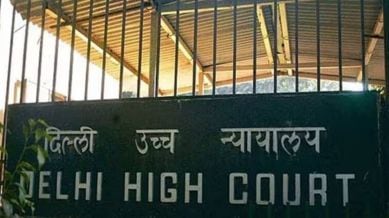Can prisoners have a mobile phone in open jail precincts?: Delhi HC seeks clear SOP
The court has directed the DG (Prisons) to frame and notify an SOP that either permits retention of mobile phones by open-prison inmates — who are permitted to exit the prison complex — or establishes a deposit and return facility

Noting that there is no clarity on whether a prisoner is barred from possessing a phone in open prison precincts, the Delhi High Court has directed the Director General (Prisons) to frame a Standard Operating Procedure (SOP) on this aspect.
Justice Sanjeev Narula issued the direction in an order dated October 28 — which was made accessible on Friday — while dealing with the petition of a life convict in open prison who was found to be in possession of a mobile phone. The violation was counted as a breach of prison rules and he was punished with a transfer to a closed prison.
monthly limit of free stories.
with an Express account.
Open prisons and semi-open prisons were established to facilitate the rehabilitation and re-integration of prisoners into society by offering a less restrictive environment to those who have shown consistent good conduct as an indication of reformation. The Delhi Prison Rules, 2018, distinguishes between inmates of open and semi-open prisons from those in closed prisons. For instance, inmates in open prisons are entitled to exit the prison complex daily between 8 am and 8 pm for gainful employment.
Justice Narula, while issuing the directions, reasoned, “A… practical point bears mention. For inmates in open prisons, a mobile telephone often functions as the basic conduit for contact with family, work coordination, transport, and digital payments during authorised hours outside. If possession within the open-prison precincts is prohibited, there ought to be a clear, workable system for secure deposit and retrieval so that compliance is feasible.”
“Without such an arrangement, the rules risk placing inmates in a pincer, liable to violation either for keeping a device or for being unable to function outside,” it added.
The court has directed the DG (Prisons), “after consulting relevant stakeholders, to frame and notify an SOP that either permits retention of mobile phones by open-prison inmates under regulated conditions, or establishes a secure deposit and return facility for hours when inmates are required to remain inside the open-prison precincts. It shall be finalised and made operational within eight weeks.”
The court was hearing a petition filed by Surender Kumar, 45, who was convicted on charges of murder and cruelty to a woman in 2011. The SC confirmed his conviction in 2014.
Owing to his good conduct, he was transferred from a semi-open jail to an open prison in June 2019. While lodged in the open prison, Kumar was permitted daily release between 8 am and 8 pm.
In January 2020, during a search in all the wards of the jail, two mobile phones were recovered from his ward. He was punished with stoppage of the Inmate Calling System (ICS) and canteen facility for a month on the grounds of possessing mobile phones.
In August 2020, a judicial appraisal was made by the inspecting judge who then recommended his transfer from the open prison to a closed prison. Kumar, through advocate Sarthak Maggon, had contested that the transfer to a closed jail has resulted in a disproportionate curtailment of a valuable rehabilitative privilege, and procedural infirmity was also pointed out where he was transferred prior to the judicial appraisal.
The court noted that jail records show his conduct as “unsatisfactory” only owing to this incident.
Kumar had also contested such an assessment, highlighting that he has been granted parole and furlough on more than 20 occasions and has returned without adverse report. It was also pointed out that the authorities have been rejecting his requests for premature release after spending more than 19 years in prison, solely on the basis of the January 2020 punishment ticket.
“Indeed, placement in an open prison is a privilege earned through sustained good conduct over a substantial span of custody. It is not conferred lightly and, once granted, cannot be withdrawn on a perfunctory footing. Where the entire edifice for withdrawal rests on a solitary punishment ticket, closer judicial scrutiny is warranted to ensure that both the fact of violation and the procedure for imposing a major penalty were sound, fair, and proportionate,” the court reasoned while adjudicating his case.
Observing that the prison authorities had failed to adhere to due process — by not issuing a written notice calling upon the prisoner to show cause — before imposing a major punishment, as per the Delhi Prison Rules, Justice Narula pointed out, “These requirements are not formalities but essential elements of fair procedure in any quasi-judicial process that restricts a substantial rehabilitative liberty. Where the foundational search report is missing and the mandatory notice and inquiry are concededly absent, the decision is vitiated for breach of the Rules and of principles of natural justice. A subsequent ‘judicial appraisal’ by an Inspecting Judge cannot cure a void created by non-compliance at the stage where facts are found and rights are affected.”